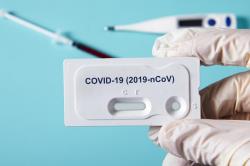 The emergence of an epidemic such as COVID-19 makes for strange bedfellows and unexpected alliances. An advocacy group comprising hog farmers in South Dakota is working with the United Food and Commercial Workers International Union to reduce the mounting incidence of COVID-19 in Midwest packing plants. Farmers recognize their vulnerability with respect to maintaining the chain of production with packing plants representing the sensitive link in the chain extending from grow-out houses to the consumer.
The emergence of an epidemic such as COVID-19 makes for strange bedfellows and unexpected alliances. An advocacy group comprising hog farmers in South Dakota is working with the United Food and Commercial Workers International Union to reduce the mounting incidence of COVID-19 in Midwest packing plants. Farmers recognize their vulnerability with respect to maintaining the chain of production with packing plants representing the sensitive link in the chain extending from grow-out houses to the consumer.
Nick Nemec a prominent farmer in South Dakota commented "too many workers are being sent back into meat packing plants without adequate protection in place, thereby reigniting more outbreaks in the plants and our communities". Many plants ceased operation due to ascending incidence rates of COVID-19. After cleaning, reconfiguring of lines, instituting antigen assays and providing PPE, many plants have recommenced operation, albeit at reduced rates.
A measure of legal protection was incorporated into the Presidential Executive Order mandating reopening of plants to maintain the nation’s supply of protein provided CDC guidelines are followed. It is estimated that during late March through early April, hog and beef production was reduced by 40 to 50 percent. Currently red meat plants are operating at between 70 and 80 percent of capacity depending on location and the policies of operators. Most recently a Tyson Foods hog plant in Storm Lake, IA was closed temporarily due to a 22 percent positive COVID-19 rate. Tyson Foods was proactive in initiating testing using the services of a specialist agency that deployed mobile testing installations for all Company plants. Tyson also recognized the vulnerability of workers and introduced PPE and training of personnel in early April.
The impact of COVID-19 will ultimately be reduced by a combination of immunization using an effective vaccine and a rise in the level of immunity through natural exposure. Cycles of infection will continue until immunity is achieved in 70 percent of the population. This desirable situation cannot be expected before mid-2021.
Periodic decontamination of plants and supplying PPE are only ameliorative. COVID-19 infection will persist given the high level of susceptibility in our population and the ease of transmission of infection both in plants and the communities where workers live.

It is estimated that there have been 3,000 confirmed COVID-19 diagnoses with 44 fatalities among approximately 50,000 meat-packing workers in the U.S. since the emergence of COVID-19. The number of cases is obviously underestimated given the fact that only a few companies have adopted a policy of testing a high proportion of their workers. It is evident that at any point in time the low sensitivity of available antigen assays are yielding an unacceptable number of false-negative results allowing asymptomatic carriers to disseminate virus. Control of COVID-19 in rural communities with large packing plants is complicated by lack of transparency. Some companies, abetted by officials in states such as Nebraska, are failing in their collective responsibility by withholding data on prevalence rates in specific plants. In the absence of a national policy on diagnosis and control of COVID-19 we are reliant on the openness of companies such as Tyson Foods, Perdue Farms and others demonstrating their civic-mindedness by releasing data for the benefit of their employees and officials responsible for public health in the communities where they operate.